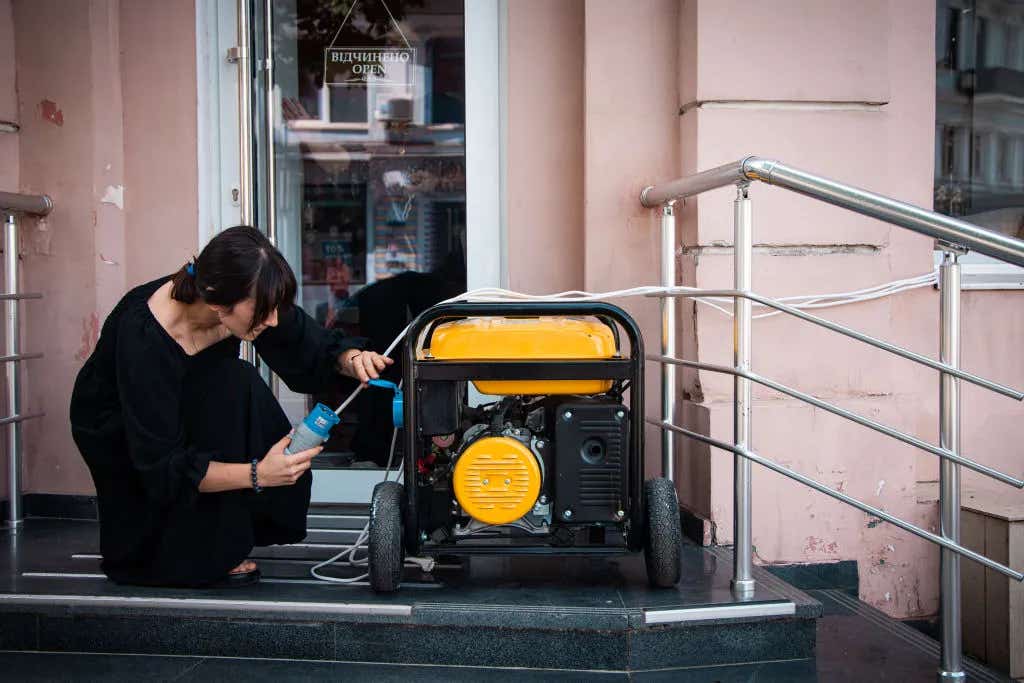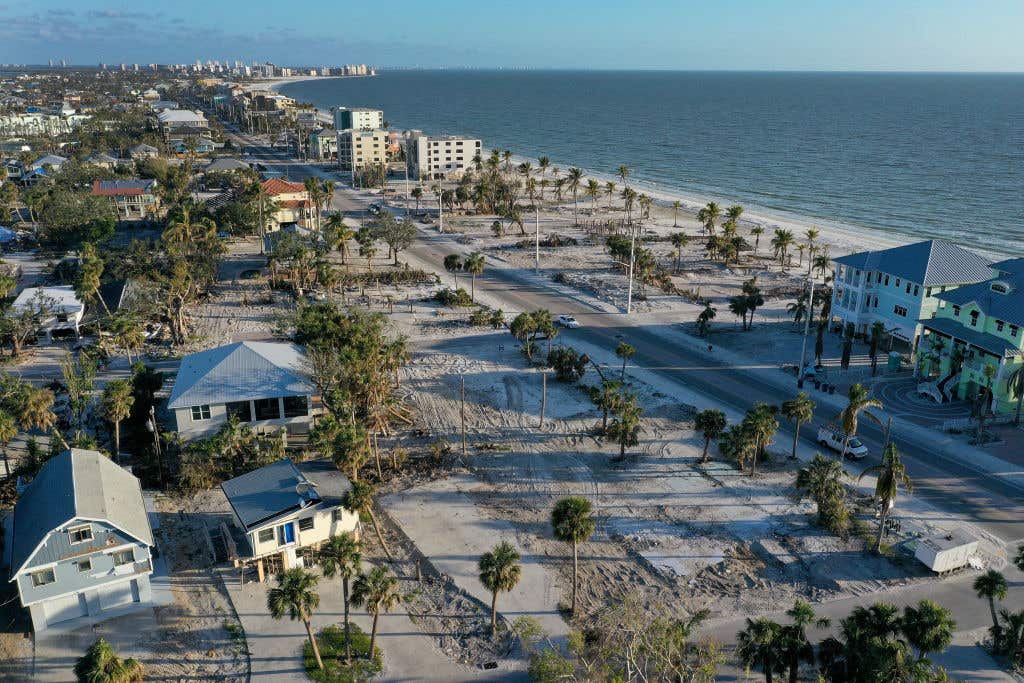
You don't think about the dangers of a generator until you see one nearly burn your house down! According to NBC2, the Cape Coral fire Department have been busy, responding to not one, but two fires sparked by generators. And what caused them? People storing gasoline too close to the generator. You'd think it's common sense, but apparently, it’s not. Luckily, nobody got hurt. But still, who wants their house going up in flames?
I remember when I first got my generator. You know how Florida is… Hurricanes, power outages, all that fun stuff. Anyway, I fired it up, had it running in the backyard, and after a while, I noticed that bad boy was HOT. And I don’t mean like “I need a towel” kind of hot. I’m talking sizzling. I thought, If I’m not careful, this thing’s gonna blow up my comic book collection! That’s when I started getting real serious about safety.
Cape Coral Fire Department Tips:
 (Photo by Sean Rayford/Getty Images)
(Photo by Sean Rayford/Getty Images)Here’s the thing, the Cape Coral Fire Department isn’t trying to nag ya, they’re just dropping some fire facts. You’ve gotta keep the generator at least 20 feet away from your house. Seems obvious, right? But people keep putting them way too close. And for the love of god, don’t run the thing inside your garage. That’s just asking for trouble. Carbon monoxide, dude! It’ll get you before the flames even think about it.
The Cape Coral Fire Department also say you’ve gotta let your generator cool off before you refuel it. Trust me, pouring gas on a hot machine sounds like a recipe for disaster. Oh, and speaking of gas, store it somewhere cool and away from heat. Don’t just leave it chilling next to the generator.
It all comes down to common sense, man. You wouldn’t leave a match near gasoline, right? Same thing here. Keep your house intact, and don’t let your generator turn into a danger worse than the hurricane was!
7 Severe Weather Safety Tips That May Save Your Life
Nobody likes dealing with severe weather. But, it's part of life. Depending on where you live in the United States, you might come up against hurricanes, tornados, severe thunderstorms, blizzards and more. I've certainly had my fair share of severe weather events. Probably my most vivid memory was being in an ice storm, which knocked power out for about a week where I lived, including during Christmas. It was freezing cold, so my family and I had to go to a hotel that was out of town. Needless to say, our Christmas plans were totally different that year. So, what are some severe weather safety tips that may safe your life?
Before we get to the main tips, let's get through some basics. Stay informed when a severe weather event is approaching. It's simple but important. You don't want to be caught off guard when bad weather strikes. The National Oceanic and Atmospheric Administration and National Weather Service both have information that they provide leading up to and during a severe weather event. So, make sure to get the latest information in the case of any weather emergency. Local meteorologists also have good information, but the main alerts come from the National Weather Service.
Another mistake some people make is not taking "watches" seriously. For example, you might see that there's a severe thunderstorm watch in your area and think, oh, it's just a watch, I can go out for a walk. Don't do it. "A watch is used when the risk of a hazardous weather or hydrologic event has increased significantly, but its occurrence, location or timing is still uncertain," the National Weather Service explains. We'll get more into the specifics of a watch, warning and advisory later in this story.
Let's get into some severe weather safety tips that may safe your life.
1. Know the Difference Between an Advisory, Watch and Warning
A weather advisory, watch and warning all need to be taken seriously. So, what do they mean? According to the National Weather Service, "a warning is issued when a hazardous weather or hydrologic event is occurring, imminent or likely." A watch is where "the risk of a hazardous weather or hydrologic event has increased significantly, but its occurrence, location or timing is still uncertain." Finally, an advisory means, "hazardous weather or hydrologic event is occurring, imminent or likely."
2. Stay Inside at All Costs
During a severe thunderstorm, and any severe weather event, the best thing to do is stay inside and sheltered. "The best defense against thunderstorms is to stay inside a sturdy building or shelter that can protect you from deadly lightning, large hail, damaging winds, flooding rain and tornadoes," the National Weather Service says. Also, you don't want to risk getting hit by lightning, like in the image below.
3. Get Low and Protected
During a tornado, get underground if possible. If you don't have a basement, get to the lowest floor possible. Also, during a tornado, watch for flying and falling debris. The National Weather Service advises to "use pillows, blankets, coats, helmets, etc. to cover up and protect your head and body from flying debris."
4. Always Have an Emergency Kit
Be prepared. Have a good emergency kit, both in your house and your car. For the car, "An emergency kit should include booster cables, shovel, tow rope, sand or cat litter, and a flashlight with extra batteries," the National Weather Service says. "Do not forget a first aid kit, non-perishable food, and blankets or sleeping bags."
5. Stay Gassed Up
This one my mom and dad always tell me to do. And, they're right. "Keep your gas tank near full to avoid ice in the tank and fuel line," the National Weather Service advises.
6. Be Prepared for Heat, Too
Heat can make for a severe weather event, too. So, dress appropriately when it gets really hot. "Lightweight, light-colored clothing reflects heat and sunlight, and helps your body maintain normal temperatures," the National Weather Service says. They add to guzzle lots of "water or non-alcoholic fluids."
7. Don't Stick Around
Sometimes, you just have to leave ahead of the storm to be safe. In the case of a hurricane, the National Weather Service says to "leave immediately if ordered." They also say that if you are allowed to stay, to "take refuge in a small interior room, closet or hallway on the lowest level during the storm. Put as many walls between you and the outside as you can," and "stay away from windows, skylights and glass doors."
More tips
Weather isn't just about thunderstorms and tornados. Air quality is a big part of weather events these days, too. Be on the lookout for air quality alerts in your area. If you have respiratory issues, you should wear a mask when out and about in bad air quality. You should also say inside if the air quality is especially bad.
Be safe on the beach
Even on a perfect weather day, if you're at the beach, there are risks. The NOAA states, "To stay safe, you need to stay aware of the weather, the ocean, tide, and what is going on around you." They add, "Storms, such as thunderstorms, tropical storms, and hurricanes far out at sea can create dangerous waves and currents at the beach, even on a sunny day!"





